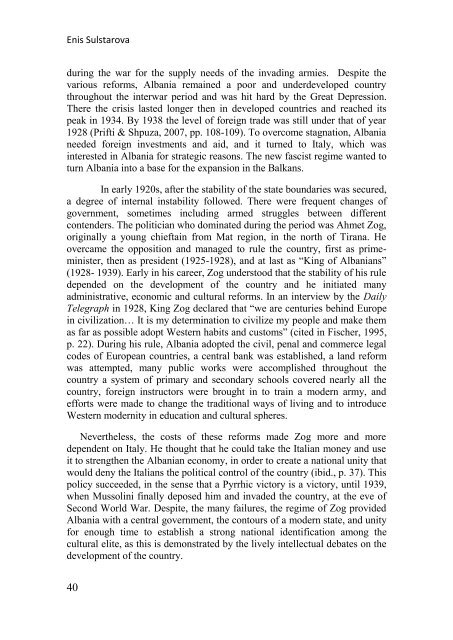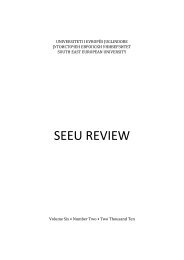SEEU Review vol. 5 Nr. 2 (pdf) - South East European University
SEEU Review vol. 5 Nr. 2 (pdf) - South East European University
SEEU Review vol. 5 Nr. 2 (pdf) - South East European University
Create successful ePaper yourself
Turn your PDF publications into a flip-book with our unique Google optimized e-Paper software.
Enis Sulstarova<br />
during the war for the supply needs of the invading armies. Despite the<br />
various reforms, Albania remained a poor and underdeveloped country<br />
throughout the interwar period and was hit hard by the Great Depression.<br />
There the crisis lasted longer then in developed countries and reached its<br />
peak in 1934. By 1938 the level of foreign trade was still under that of year<br />
1928 (Prifti & Shpuza, 2007, pp. 108-109). To overcome stagnation, Albania<br />
needed foreign investments and aid, and it turned to Italy, which was<br />
interested in Albania for strategic reasons. The new fascist regime wanted to<br />
turn Albania into a base for the expansion in the Balkans.<br />
In early 1920s, after the stability of the state boundaries was secured,<br />
a degree of internal instability followed. There were frequent changes of<br />
government, sometimes including armed struggles between different<br />
contenders. The politician who dominated during the period was Ahmet Zog,<br />
originally a young chieftain from Mat region, in the north of Tirana. He<br />
overcame the opposition and managed to rule the country, first as primeminister,<br />
then as president (1925-1928), and at last as “King of Albanians”<br />
(1928- 1939). Early in his career, Zog understood that the stability of his rule<br />
depended on the development of the country and he initiated many<br />
administrative, economic and cultural reforms. In an interview by the Daily<br />
Telegraph in 1928, King Zog declared that “we are centuries behind Europe<br />
in civilization… It is my determination to civilize my people and make them<br />
as far as possible adopt Western habits and customs” (cited in Fischer, 1995,<br />
p. 22). During his rule, Albania adopted the civil, penal and commerce legal<br />
codes of <strong>European</strong> countries, a central bank was established, a land reform<br />
was attempted, many public works were accomplished throughout the<br />
country a system of primary and secondary schools covered nearly all the<br />
country, foreign instructors were brought in to train a modern army, and<br />
efforts were made to change the traditional ways of living and to introduce<br />
Western modernity in education and cultural spheres.<br />
Nevertheless, the costs of these reforms made Zog more and more<br />
dependent on Italy. He thought that he could take the Italian money and use<br />
it to strengthen the Albanian economy, in order to create a national unity that<br />
would deny the Italians the political control of the country (ibid., p. 37). This<br />
policy succeeded, in the sense that a Pyrrhic victory is a victory, until 1939,<br />
when Mussolini finally deposed him and invaded the country, at the eve of<br />
Second World War. Despite, the many failures, the regime of Zog provided<br />
Albania with a central government, the contours of a modern state, and unity<br />
for enough time to establish a strong national identification among the<br />
cultural elite, as this is demonstrated by the lively intellectual debates on the<br />
development of the country.<br />
40

















